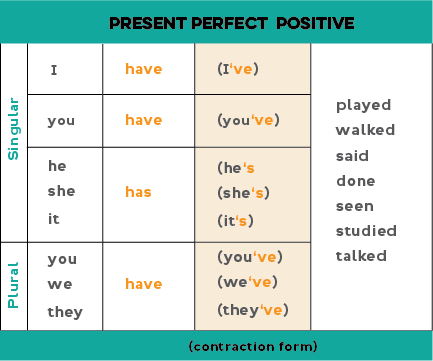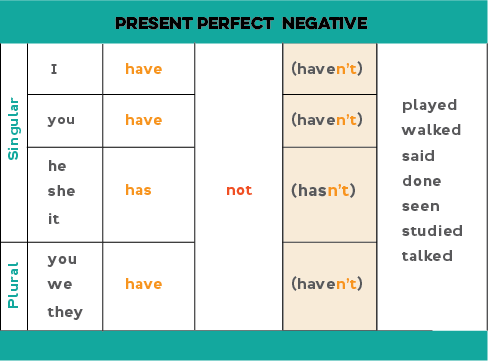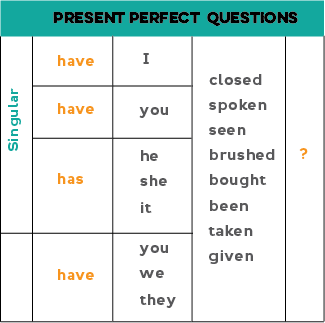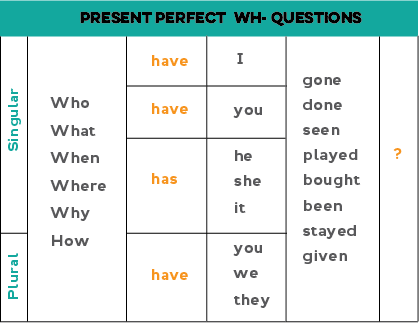
This tense is formed using the auxilliary verb "have" (have /has) plus the past participle of the main verb. We'll learn how to make positive and negative forms, short forms (contractions) and questions.

To form the present perfect: we use "have" / "has" + the past participle .
Note: You can also use contractions: I have = I've; you have = you've; he has = he's; she has = she's we have = we've; they have = they've
To form the past participle: add "ed" to the infinitive form of regular verbs. We use the same form for each subject (e.g., I, you, he).
Sometimes there are spelling changes when forming the past participle:
1. If the verb ends with "y", we change it to -i and add -ed (but only if there's a consonant before the -y):
2. If the verb ends with "e" , we add just a "d" (not "ed"):
3. Double the final consonant after a short stressed vowel if the verb ends in a CVC (consonant vowel consonant)*:
(*except CVC endings with w, x, or y)
Many verbs have irregular past participles.
Unfortunately, you have to memorize them. Here are many of the irregular forms:
be — been
become — become
begin — begun
break — broken
bring — brought
buy — bought
catch — caught
choose — chosen
come — come
cost — cost
cut — cut
do — done
draw — drawn
drink — drunk
drive — driven
eat — eaten
fall — fallen
feel — felt
fight — fought
find — found
fly — flown
forget — forgotten
get — gotten
give — given
go — gone
grow — grown
hang — hung
have — had
hear — heard
hide — hidden
hit — hit
hold — held
hurt — hurt
keep — kept
know — known
leave — left
lend — lent
let — let
light — lit
lose — lost
make — made
mean — meant
meet — met
pay — paid
put — put
read — read
ride — ridden
ring — rung
rise — risen
run — run
say — said
see — seen
sell — sold
send — sent
shine — shone
shoot — shot
shut — shut
sing — sung
sit — sat
sleep — slept
speak — spoken
spend — spent
stand — stood
steal — stolen
swim — swum
take — taken
teach — taught
tear — torn
tell — told
think — thought
throw — thrown
wake — woken
wear — worn
win — won
write — written

To form the negative, simply add "not" after "have" / "has":
We can also use the contractions hasn't / haven't (has not = hasn't, have not = haven't)

To form questions use:
We can answer no questions with a full or a shorter answer by using contractions (hasn't / haven't) with negative answers.
Have you done your homework?
Have they eaten?

Notice the word order. The wh- question word comes before "have / has " and then the past participle.
Whew! We covered a lot of information on this page. Check back for exercises that will help you practice the present perfect in its different forms.

Copyright © 2013-2024 OysterEnglish.com All rights reserved | Privacy policy